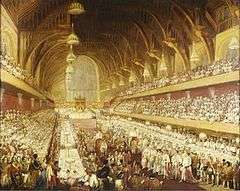1821 in the United Kingdom
| |
| Other years |
| 1819 | 1820 | 1821 | 1822 | 1823 |
Events from the year 1821 in the United Kingdom. This is a Census year.
Incumbents
- Monarch - George IV
- Prime Minister - Earl of Liverpool (Tory)
Events

The coronation banquet for George IV
- 16 January - The Tories under Robert Jenkinson, 2nd Earl of Liverpool win the general election which had begun in 1820.
- 18 February - Launch of the New Observer newspaper, later to become The Sunday Times.[1]
- April/May - John Constable completes his painting The Hay Wain.[2]
- 5 May - The Guardian newspaper founded as The Manchester Guardian.[1]
- 7 May - Bank of England returns to the gold standard.[3]
- 28 May - The national Census is the first to measure age distribution and reveals that almost half of the population is under twenty years old.[4]
- 4 July - Redesigned Haymarket Theatre opens in London.[3]
- 19 July - George IV is crowned king of the United Kingdom of Great Britain and Ireland.[5] His estranged wife, Caroline of Brunswick, is turned away from the coronation ceremony. This is the last coronation at which the full ceremony of the King's Champion is carried out.
- 31 July - Opening of the Eau Brink Cut, improving the outfall of the River Great Ouse at King's Lynn in Norfolk. Engineers working on the project included John Rennie the Elder, Thomas Telford and Thomas Hyde Page.[6]
- undated - Elizabeth Fry and others establish the British Ladies' Society for Promoting the Reformation of Female Prisoners, an early example of a national women's organisation.
Publications
- Thomas De Quincey's autobiographical Confessions of an English Opium-Eater (anonymously in The London Magazine).
- Walter Scott's novel Kenilworth.
- Percy Bysshe Shelley's elegy Adonais.
Births
- 3 February - Elizabeth Blackwell, abolitionist and women's rights activist (died 1910)
- 17 February - Lola Montez, dancer and mistress of Ludwig I of Bavaria (died 1861 (United States))
- 15 March - William Milligan, theologian (died 1892)
- 19 March - Richard Francis Burton, explorer (died 1890)
- 3 April - T. Pelham Dale, mystic (died 1892)
- 27 April - Henry Willis, organ builder (died 1901)
- 11 October - George Williams, founder of the YMCA (died 1905)
- 30 November - Frederick Temple, Archbishop of Canterbury (died 1902)
- 11 December - George Granville Bradley, divine and scholar (died 1903)
Deaths
- 23 February - John Keats, poet (born 1795)
- 4 March - Princess Elizabeth of Clarence daughter of William, Duke of Clarence (later King William IV) (born 1820)
- 7 August - Caroline of Brunswick, queen consort of King George IV (born 1768)
- 4 October - John Rennie the Elder, civil engineer (born 1761)
References
- 1 2 "Concise History of the British Newspaper in the Nineteenth Century". Archived from the original on 24 February 2008. Retrieved 2008-03-17.
- ↑ "Icons, a portrait of England 1820-1840". Archived from the original on 22 September 2007. Retrieved 2007-09-12.
- 1 2 Palmer, Alan; Veronica (1992). The Chronology of British History. London: Century Ltd. pp. 251–252. ISBN 0-7126-5616-2.
- ↑ "1821". 2011 Census. 2011. Retrieved 2011-02-13.
- ↑ Penguin Pocket On This Day. Penguin Reference Library. 2006. ISBN 0-14-102715-0.
- ↑ Hills, Richard L. (1967). Machines, Mills and uncountable costly necessities: a short history of the drainage of the Fens. Norwich: Goose & Sons.
Further reading
- New Annual Register...for 1821, London: Longman, 1822
| ||||||||||
This article is issued from Wikipedia - version of the Sunday, September 27, 2015. The text is available under the Creative Commons Attribution/Share Alike but additional terms may apply for the media files.